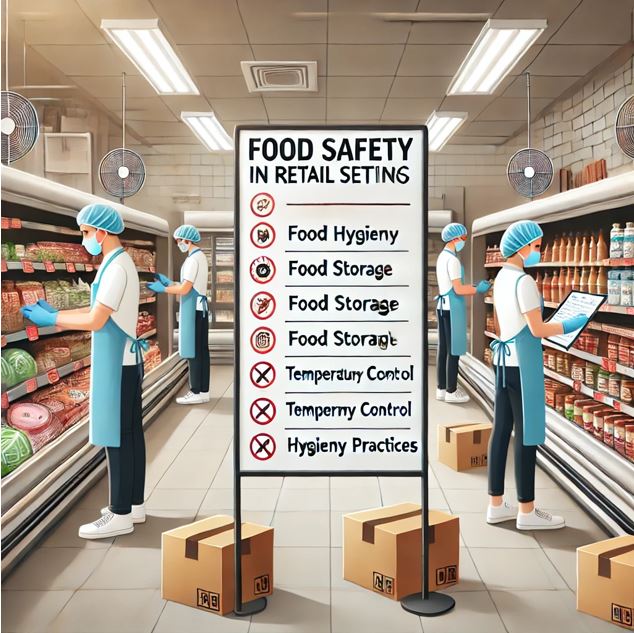
LEVEL 2 AWARD FOR FOOD SAFETY IN RETAIL
LEVEL 2 AWARD FOR FOOD SAFETY IN RETAIL
Course Overview:
The Level 2 Award for Food Safety in Retail is designed for individuals working in the retail food sector, providing essential knowledge and skills for maintaining food safety in retail environments. This course covers key areas such as food handling, storage, hygiene, and the legal requirements for food safety in retail settings. It aims to ensure that individuals involved in the handling, preparation, and selling of food understand the principles of food safety and how to apply them in their day-to-day work.
Benefits:
- Enhanced Food Safety Knowledge: Understand food safety principles and practices specific to retail environments.
- Regulatory Compliance: Learn how to meet legal food safety requirements to avoid penalties and ensure consumer safety.
- Improved Hygiene Standards: Gain the skills to implement best practices for hygiene and sanitation, reducing the risk of foodborne illness.
- Boost Career Opportunities: Open the door to job opportunities in food retail, with a solid understanding of food safety regulations and practices.
Learning Outcomes:
Upon completion of this course, learners will be able to:
- Recognize food safety hazards in retail settings and implement appropriate control measures.
- Understand the importance of personal hygiene and food handling practices in maintaining food safety.
- Identify potential risks related to food storage, preparation, and display.
- Comprehend food safety laws and regulations relevant to the retail sector.
- Implement safe working practices to prevent contamination and ensure safe food delivery to consumers.
Study Units:
- Introduction to Food Safety: Overview of food safety principles and why it is important in retail.
- Foodborne Illnesses and Hygiene: Understanding foodborne illnesses, their symptoms, and prevention through proper hygiene.
- Food Handling and Storage: Best practices for storing, handling, and preparing food safely.
- Temperature Control: The importance of temperature control in food safety and how to monitor and maintain proper temperatures.
- Health, Hygiene, and Safety Legislation: Legal requirements and best practices to comply with food safety laws and regulations in retail.
- Cleaning and Sanitation: Importance of cleaning and sanitizing food contact surfaces and equipment.
Career Progression:
This qualification provides a strong foundation for a career in the food retail industry, opening up opportunities such as:
- Retail Food Handler: Ensuring food safety at all stages of food handling, from receiving deliveries to serving customers.
- Food Safety Supervisor: Overseeing and ensuring food safety practices are maintained in retail environments.
- Hygiene Officer: Responsible for monitoring hygiene standards, conducting inspections, and training staff on best practices.
- Health and Safety Officer: Working within food retail businesses to ensure compliance with health and safety regulations.
For those seeking to further advance in food safety and quality assurance roles, additional qualifications such as Level 3 Food Safety and Health and Safety Management courses can be pursued.
Our assessment process is designed to ensure every learner achieves the required level of knowledge, skills, and understanding outlined in each course unit.
Purpose of Assessment
Assessment helps measure how well a learner has met the learning outcomes. It ensures consistency, quality, and fairness across all learners.
What Learners Need to Do
Learners must provide clear evidence that shows they have met all the learning outcomes and assessment criteria for each unit. This evidence can take different forms depending on the course and type of learning.
Types of Acceptable Evidence
Assignments, reports, or projects
Worksheets or written tasks
Portfolios of practical work
Answers to oral or written questions
Test or exam papers
Understanding the Structure
Learning outcomes explain what learners should know, understand, or be able to do.
Assessment criteria set the standard learners must meet to achieve each learning outcome.
Assessment Guidelines
All assessment must be authentic, current, and relevant to the unit.
Evidence must match each assessment criterion clearly.
Plagiarism or copied work is not accepted.
All learners must complete assessments within the given timelines.
Where applicable, assessments may be reviewed or verified by internal or external quality assurers.
Full learning outcomes and assessment criteria for each qualification are available from page 8 of the course handbook.
Top Courses
No results found.
Related Courses
Let's Get in touch
Deleting Course Review
Course Access
This course is password protected. To access it please enter your password below:



